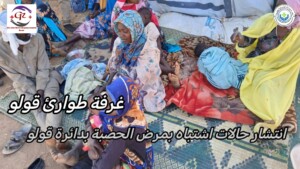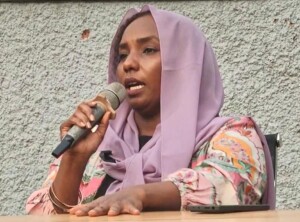Coronavirus: ‘Sudan needs a total lockdown for two weeks’
Sudanese politicians and civil society activists have described the measures taken by the government to limit the spread of the coronavirus (Covid-19) as good but incomplete. They recommend a total lock-down for two weeks and support for the most vulnerable people in the country.
 Sudanese students in Wuhan, China, were evacuated on March 3, 2020 (Social media)
Sudanese students in Wuhan, China, were evacuated on March 3, 2020 (Social media)
Sudanese politicians and civil society activists have described the measures taken by the government to limit the spread of the coronavirus (Covid-19) as good but incomplete. They recommend a total lockdown for two weeks and support for the most vulnerable people in the country.
So far Sudan recorded three coronavirus patients, all of them this month. This first case, a man in his 50s, died in Khartoum on March 10.
On January 28, the Sudanese government set up checkpoints at the borders and the Khartoum International Airport. This Monday, Khartoum imposed a State of Emergency in the country, with a curfew from 8 pm to 6 am, closure of the borders, and a ban on air traffic. Schools and markets have been closed. Gatherings are prohibited. At 8 pm on Thursday, public transport to the states came to a halt as well.
However, stronger precautionary measures should be taken, according to Hafiz Ismail, former banker and head of the NGO Justice Africa Sudan. “It would be better to have a temporary total lockdown.”
He told Radio Dabanga yesterday that the measures taken by the government, such as the closure of schools and universities and the banning of travel to the states are “steps in the right direction”.
Yet, he believes that the dusk-to-dawn curfew has no significant effect, given that more people leave their home during the day, especially working people, and make use of public transportation.
“The required action to prevent the spread of corona now is to seriously consider a total curfew in the entire country for two weeks,” Ismail advised. “At the same time, the government should deal with the impact of such a curfew on people's livelihoods. The huge informal sector consists of day labourers and itinerant traders. They will need support and provision of resources during this period.”
In addition, social solidarity should be encouraged among the Sudanese “in order to pass this period as safely as possible”.
Informal sector
The Communist Party of Sudan has called for making use of “all capabilities of the state”, including military and security forces, to combat the spread of the coronavirus.
In a statement on Thursday, the party pointed to the need to reduce the impact of the isolation measures on the most vulnerable people, “including craftsmen, food and beverage sellers, and agricultural workers,” by supporting them directly.
“The many Sudanese working in the informal sector do not have the luxury to stay at home, as they need to secure their food each day,” the statement reads.
“The ministries of Finance, Trade, Labour, Social Welfare, and Health should provide the funds necessary to monitor and support these groups, reduce the risk of contracting the highly contagious disease themselves and their relatives, and provide them with health and food supplies.”
The Communist Party also called for a better inspection of workers conditions in factories, a reduction of their working hours or offering them a paid vacation. Business owners should be obliged to heed occupational health guidelines.
Earlier this month, Dr Majda Mustafa, head of the economics department of the International University of Sudan, called on the government to mitigate the effects of coronavirus measures in the country. She recommended the government to direct banks to provide soft finance to small- and medium-sized businesses that need liquidity, and postpone any instalments due.
Street children
In Khartoum, a group of youth activists and neighbourhood committees have formed an “Emergency Catering Room” with the aim to tackle the effects of the curfew imposed on Monday.
With the help of neighbourhood committees, they began to provide meals, disinfectants, and information about the coronavirus to street children.
Radio Dabanga’s editorial independence means that we can continue to provide factual updates about political developments to Sudanese and international actors, educate people about how to avoid outbreaks of infectious diseases, and provide a window to the world for those in all corners of Sudan. Support Radio Dabanga for as little as €2.50, the equivalent of a cup of coffee.












 and then
and then